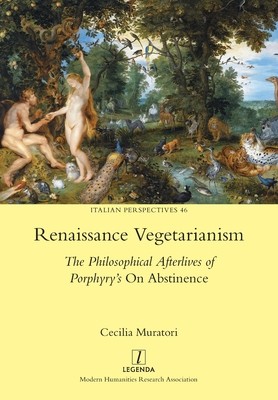
- We will send in 10–14 business days.
- Author: Cecilia Muratori
- Publisher: Legenda
- ISBN-10: 1781883416
- ISBN-13: 9781781883419
- Format: 17 x 24.4 x 1.5 cm, minkšti viršeliai
- Language: English
- SAVE -10% with code: EXTRA
Reviews
Description
Should a philosopher be vegetarian? This question had been famously answered in the affirmative in a classic work on philosophical vegetarianism: On Abstinence from Eating Animals, written by the Neoplatonist Porphyry in the third century AD. This study traces the rekindling of interest in On Abstinence in the Renaissance. It shows that long before the term 'vegetarianism' emerged, philosophers, physicians and religious figures discussed the advantages and disadvantages of choosing a meat-free diet. As On Abstinence circulated, via editions and translations, the key questions posed by Porphyry stimulated new debates: is vegetarianism compatible with religious piety? Does a vegetable diet promote or endanger health and longevity? What can be learnt from observing the diets of other, geographically distant populations, such as the vegetarian Brahmans of India, or the cannibals in America? And finally, is it ethically justifiable to eat beings to which sentience and rationality may be attributed?
Cecilia Muratori is Research Fellow at the Centre for Anglo-German Cultural Relations, Queen Mary University of London, and Tutor in Philosophy at the Institute of Continuing Education, University of Cambridge.
EXTRA 10 % discount with code: EXTRA
The promotion ends in 23d.15:41:52
The discount code is valid when purchasing from 10 €. Discounts do not stack.
- Author: Cecilia Muratori
- Publisher: Legenda
- ISBN-10: 1781883416
- ISBN-13: 9781781883419
- Format: 17 x 24.4 x 1.5 cm, minkšti viršeliai
- Language: English English
Should a philosopher be vegetarian? This question had been famously answered in the affirmative in a classic work on philosophical vegetarianism: On Abstinence from Eating Animals, written by the Neoplatonist Porphyry in the third century AD. This study traces the rekindling of interest in On Abstinence in the Renaissance. It shows that long before the term 'vegetarianism' emerged, philosophers, physicians and religious figures discussed the advantages and disadvantages of choosing a meat-free diet. As On Abstinence circulated, via editions and translations, the key questions posed by Porphyry stimulated new debates: is vegetarianism compatible with religious piety? Does a vegetable diet promote or endanger health and longevity? What can be learnt from observing the diets of other, geographically distant populations, such as the vegetarian Brahmans of India, or the cannibals in America? And finally, is it ethically justifiable to eat beings to which sentience and rationality may be attributed?
Cecilia Muratori is Research Fellow at the Centre for Anglo-German Cultural Relations, Queen Mary University of London, and Tutor in Philosophy at the Institute of Continuing Education, University of Cambridge.


Reviews